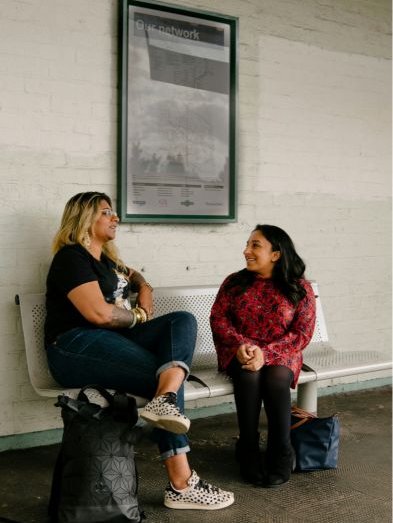Equity, Diversity and Inclusion
EDI. It's in our DNA. Learn more about who we are, and our approach.

We aim to be an organisation where people from all backgrounds and experiences can come together, be welcomed, be heard, and be valued. Our goal is to have an inclusive culture that inspires everyone to speak openly, connect with others, belong, learn, and grow.
But our EDI work does not solely focus on our internal culture. Our service for women also has these principles at its heart.
Our policy and influencing work shares power and space with women, and is developed hand-in-hand with our advisory panel of women with convictions.
A disproportionate number of women in the justice system have experienced multiple intersecting inequalities, discrimination and disadvantage their whole lives. That means that for us, EDI work isn't 'nice to have', it's essential.
“Equality is giving everyone the same pair of shoes. Equity is giving everyone a pair of shoes that fits"
Language matters. We've chosen to use the term 'equity' over 'equality', to take into account the diverse lived experiences and needs of people and communities, adapting the way we work according to these differences.

Our 2023-2026 EDI strategy
We have come a long way on our EDI journey, and are clear about what sort of organisation we want to be. Having gathered the data we need, put key staff in place to steer this work, and listened to our colleagues, we set shared objectives. We have a clear sense of purpose and an action plan, with measurement and accountability in place.
Our three objectives in our EDI strategy are:
-
 - 1 -
- 1 -Diversify our team
We'll further diversify our staff (particularly our managers) and our trustee board, to reflect the communities we serve, focusing on increasing representation of people:
- who identify as racially minoritised
- with lived experience of the justice system
- from a range of ages.
-
 - 2 -
- 2 -Build inclusion and belonging
Build on the work we have started to create a fully inclusive organisation, taking account of what colleagues say is important to them in the workplace. We are trained and we pause to reflect on the biases that we hold as individuals.
-
 - 3 -
- 3 -Campaign against inequality and social exclusion
In our policy and campaigning work, we will show how structural inequalities, social exclusion and poverty feature in the lives of the majority of women who experience the justice system.
Our commitment to anti-racism
Evidence shows that racially minoritised women are more likely to be arrested, convicted, and sentenced to harsher punishments, ending up with criminal records that last longer, compared with white women.
We are committed to creating and strengthening an anti-racist culture in Working Chance through reflection and discussion, resource sharing, exposure to issues, training and by reinforcing processes for reporting on and responding to incidents of racism.
We accept that to travel on our anti-racism journey with meaning and impact, we must question our own roles and responsibilities in challenging racial inequality within our organisation, within the systems and structures that affect the women we work with, and within society.